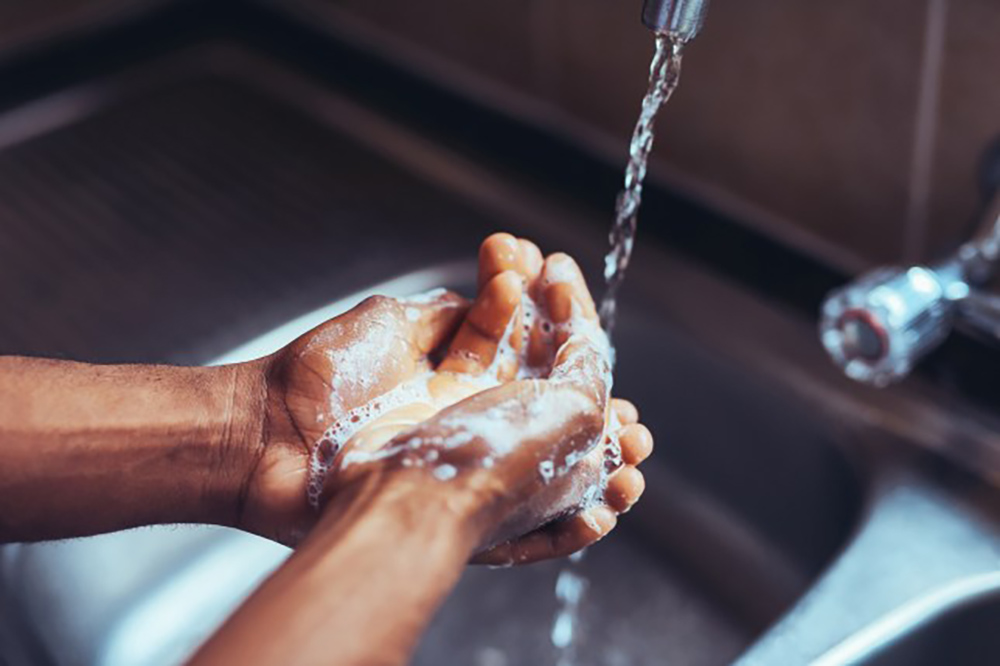By: Michelle Sconce Massaquoi
As the threat from the coronavirus grows, the Centers for Disease Control and Prevention and other public health officials are stressing the importance of hand-washing.
Prevention becomes essential to stopping the spread of the virus because there is no vaccine to prevent it and no anti-virals to treat it.
How can such a simple, low-tech solution make a difference?
Remember – coronavirus spreads easily by droplets from breathing, coughing and sneezing. As our hands touch many surfaces, they can pick up microbes, including viruses. Then by touching contaminated hands to your eyes, nose or mouth, the pathogens can infect the body.
As a microbiologist, I think a lot about the differences between microbes, such as bacteria and viruses, and how they interact with animal hosts to drive health or disease. I was shocked to read a study that indicated that 93.2% of 2,800 survey respondents did not wash their hands after coughing or sneezing.
Let me explain how washing your hands decreases the number of microbes on your hands and helps prevent the spread of infectious diseases.
Two-fisted approach
Bacteria and viruses are different in a number of ways. Bacteria are single-celled organisms that can reproduce on their own, while viruses constitute a core of genetic material encapsulated by a protein coat and can only reproduce by attaching themselves to host cells. Because viruses don’t have the organelles to reproduce, they “hijack” the cellular machinery of host cells to make multitudes of new viruses.
These differences are why antibiotics cannot kill viruses, which typically target specific structures in the cellular components of bacteria that are absent in viruses.
Despite their differences, however, the best way to prevent the disease of bacterial and viral pathogens alike is to effectively wash your hands.
There are two strategies to decreasing the amount of microbes on your hands.
The first is to decrease the overall biomass of microbes – that is, decrease the amount of bacteria, viruses and other types of microorganisms. We do this by lathering with soap and rinsing with water. Soap’s chemistry helps remove microorganisms from our hands by accentuating the slippery properties of our own skin.
The second strategy is to kill the microbes. We do this by using products with an antibacterial agent such as alcohols, chlorine, peroxides, chlorhexidine or triclosan. However, the efficacy on these agents can be variable depending on a given microbe.
Is soap and water enough?
Some academic work has shown that antibacterial soaps are more effective at reducing certain bacteria on soiled hands than soaps without them.
However, there’s a problem. Some bacterial cells on our hands may have genes that enable them to be resistant to a given antibacterial agent. This means that after the antibacterial agent kills some bacteria, the resistant strains remaining on the hands can flourish.
Further, the genes that allowed the bacteria to be resistant could pass along to other bacteria, causing more resistant strains. Even more important with respect to coronavirus, antibacterial agents, such as oral antibiotics, don’t kill viruses.
With this in mind, you may want to stick with plain old soap and water.
Going back to grade school
To clean our hands, the CDC recommends that we:
1–Wet hands with clean water
2–Apply soap and lather/scrub every nook and cranny of your hands for 20-30 seconds (about the time to sing “Happy Birthday” twice)
3–Rinse well with clean running water
4–Dry hands with a clean paper towel or air-dry.
During the 20-30 seconds of lathering the World Health Organization recommends incorporating six maneuvers to cover all parts of your hands.
If soap and water are not unavailable, the CDC recommends using an alcohol-based hand sanitizer that contains at least 60% ethanol. Alcohols have a broad-spectrum of antimicrobial activity and are less selective for resistance compared to other antibacterial chemicals. Although alcohol-based hand sanitizers may not work on all classes of germs, the WHO recommends the use of an alcohol-based hand rub to kill viruses that may be on your hands.
Not all microbes are germs
The presence of some microbes isn’t necessarily a bad thing. In fact many of the microbes that live on or within us are essential for our health.
We live in a microbial world: Trillions of different microbes colonize our skin, gut and orifices. Collectively, this consortium of bacteria, archaea, fungi and viruses are called our microbiota. A plethora of exciting research suggests that the associations of animal hosts with their microbiota are fundamentally important for the host’s biology.
Our microbiota can protect us from germs by training our immune system and by colonization resistance – the characteristic of the intestinal microbiota to block colonization of pathogens. There is ample evidence suggesting that commensal bacteria regulate invading viruses, and in some cases have a suppressive role in their infections. For example, bacteria can prevent influenza virus infection by binding or trapping them directly or by producing metabolites that decrease the stability of influenza virions.
Although more research needs to be done to understand the intricate interactions between microbial communities with host cells, consistent work illustrates that a diverse population of microbes and a balance of this community is important for our health.
Beyond hand-washing
So what is the take-home message?
There is no doubt that washing our hands with liquid soap and water is effective in reducing the spread of infectious microorganisms, including those that are resistant to antimicrobial agents.
When you don’t have the opportunity to wash your hands after touching questionable surfaces, use an alcohol-based hand sanitizer. Limit the touching of your hands to your mouth, nose and eyes.
Furthermore, maintain a healthy microbiota by limiting stress, getting enough sleep and “fertilizing” your gut microbes with a diversity of plant-based foods. It’s not only a small world, but a dirty one as well.
(AP)
Michelle Sconce Massaquoi is a doctoral candidate in microbiology at the University of Oregon





